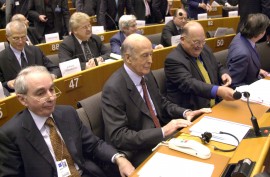
Report from the AGM, 11 May 2002
John Pinder said he would speak about what the European Constitutional Convention must do, not what he thinks it will do. Andrew Duff had spoken at the seminar on 2 February about the Anglo-French proposal for an inter-governmental Europe. This threatens to lead to a decline in the European Union. The European Union can instead become a federal Union which would be good for Europe and good for the world.
The word “constitution” isn’t much help if we do not know the content of the constitution. During the life of the European Union, the French have introduced many instruments of policy to the EU, for example the euro, but they haven’t contributed as much to building up the institutions. France does not have such a positive experience of parliamentary government as some other countries in Europe. The British could promote parliamentary government for the Union, but Westminster is in a time-warp. However, Germany is a strong supporter of federal parliamentary democracy. The president of the convention, Valéry Giscard D’Estaing, is steeped in the French presidential tradition, though he wants the Convention to succeed, so he will go along with an emerging consensus.
If a consensus is to emerge from the Convention to support the idea of a parliamentary rather than an intergovernmental Union, good people in the Convention will have to stand up for what is necessary.
The European Union doesn’t need many new competences, but we should think along the Spinelli line regarding the institutions: there should be open legislative sessions and generalised majority voting in the Council; full co-decision for the European Parliament on all legislation and the budget; and the president of the Commission should be chosen as a result of the European parliamentary elections. We should argue for the new UK government to line up with the German government on co-decision, as this would be a powerful force in the 2004 IGC.
More information
